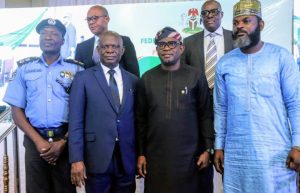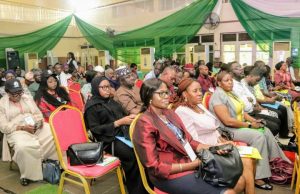

By Daniel Peters in Lagos.


The Federal Government has launched a nationwide sensitization programme on the implementation of Nigeria’s Whistleblowing Policy, aimed at boosting public awareness and enhancing its effectiveness in combating corruption.
The initiative, driven by the Presidential Initiative on Continuous Audit (PICA), was flagged off in Lagos on Wednesday, bringing together stakeholders from government agencies, the private sector, and civil society groups.
Declaring the event open, the Minister of Finance and Coordinating Minister of the Economy, Mr. Wale Edun, said the policy is designed to encourage citizens to report suspicious activities, financial crimes, mismanagement of public funds, and other illicit practices in both the public and private sectors.
Edun, represented by the Permanent Secretary, Special Duties, Mr. Raymond Omenka Omachi, outlined the programme’s objectives to include educating stakeholders on reporting procedures, ensuring protections for whistleblowers, and reinforcing accountability in the management of public resources.
“The Whistleblowing Policy provides a framework for transparency and good governance. This sensitization, starting in Lagos, underscores our commitment to protecting whistleblowers and ensuring strict compliance,” he said.
Governor Babajide Sanwo-Olu of Lagos State, represented by his Special Adviser on Taxation, Abdul-kabir Opeyemi Ogunbo, called for the review of the Whistleblowers Protection Bill to strengthen safeguards against retaliation and institutionalize the policy.
He urged Lagos residents to take advantage of the initiative to report financial infractions, stressing that the integrity of the state’s financial system depends on the active participation of citizens.
Other speakers, including the Lagos State Commissioner of Police and the Auditor-General of the Federation, commended the Federal Government for sustaining the whistleblowing initiative. They described it as a powerful tool in the fight against corruption and urged broad stakeholder engagement.
The sensitization programme featured lectures, interactive sessions, and presentations from key institutions such as the Federal Inland Revenue Service (FIRS) and the Economic and Financial Crimes Commission (EFCC).
In her remarks, the Permanent Secretary, Federal Ministry of Finance, Mrs. Lydia Shehu Jafiya—represented by Deputy Director, PICA, Mr. Oludare John—reaffirmed the ministry’s commitment to sustaining the policy. She emphasized the gains already recorded in economic recovery through whistleblowing and called for stronger collaboration among relevant agencies.
The Whistleblowing Policy, first introduced in 2016 under the administration of the late President Muhammadu Buhari, has been credited with recovering billions of naira in stolen assets. However, challenges such as low public awareness and cultural resistance to reporting misconduct have hindered its full implementation.
The Lagos programme marks the beginning of a nationwide campaign to improve compliance and rebuild public trust in governance.
Edited by Dada Ahmed.


